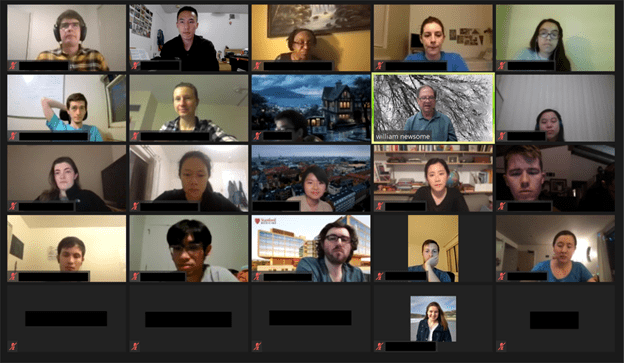
We are grateful for the opportunity to share this encouraging report from Kristel Tjandra and Nathan Wei of what might be possible in other graduate fellowships around the country. If you would like help starting something like this or would like to know more about DCM conferences, leave a comment for ESN and we’ll be in touch!
How do I live faithfully where God has placed me? Many young Christians in graduate school and the workplace are wrestling with this question today. Our colleagues, our mentors, our institutions, and our societies are telling us what to prioritize, what to pursue, how to live our lives. But what does Jesus have to say?
If you’re intrigued by this question but don’t know how to proceed, you’re not alone.
Back in February 2020, a handful of us in the InterVarsity Graduate Christian Fellowship at Stanford University were in the same boat. We had just attended a conference where, in a series of talks entitled “Thinking Through the Bible”, the speaker Christopher Watkin had challenged us not to allow our training in vocational knowledge to outpace our growth in spiritual understanding.[1] This seemed like a tall order, considering the number of hours we spent each week on research and classwork. So, four of us decided to meet once a week to review each of Dr. Watkin’s talks and apply their themes to our disciplines. By the first meeting, that group had grown to ten, in spite of our efforts to keep it small (i.e., 8 a.m. start time). And though the original series only lasted about a month, our group has continued to meet weekly – and we’ve never run out of things to talk about.
We call ourselves the Developing a Christian Mind discussion group (DCM for short), named after a conference held at Oxford[2] which a former InterVarsity Graduate and Faculty Ministry campus minister, Wendy Quay, had been replicating at Stanford for several years. And God has sustained our fellowship through much chaos and change.
When the COVID-19 pandemic arrived a few weeks after our first meeting, we moved our discussions to Zoom, which allowed us to invite friends from other parts of the country and continue meeting together even when some of us moved away from Stanford. We have spread out across the country and welcomed members from at least eight universities, all united by a common desire to know God more and understand His will for our lives. We are sharing our story not to elevate ourselves as a model, but to testify that God can use a haphazard gathering of a few curious individuals to equip His people to serve His kingdom right where He has placed them.
Our group operates on the basis of two truths: we all have questions about our faith, and we want to delve into those questions with fellow believers. Over the following couple of years, our curiosity grew into a weekly hour-and-a-half discussion that spanned various topics related to our faith and vocation. We have covered topics ranging from major theological debates in church history to ‘how to love our neighbor when it’s difficult?’ We continually ponder what success means for Christians and exhort one another to be faithful and excellent in our work.
Through breakout-room discussions and share-outs, we have grown week by week in our appreciation for God’s action in our lives and the world. Moreover, we are learning to embrace the perspectives that each person brings to the table and to sit with tough questions, uncertainty, and tensions.
One of our guest speakers coined our unofficial motto – “complicated fun” – a place where candid conversations take place and where iron sharpens iron. “This group has made me think a lot more deeply about integrating faith and work, and how I can use my faith to inform my decisions, how I interact with people and make career decisions,” said Janice Goh, a Ph.D. student at UCSF who attends our weekly meeting regularly.
*”Developing a Christian Mind” in this article is used with the permission of DCM Oxford.
[1] Audio recordings of Dr. Watkin’s talks can be found in this playlist: https://www.youtube.com/playlist?list=PLF4stHoB7p-WzqUsQTFK-57T5D_kyB1A0
[2] Video resources from previous iterations of the conference can be found on the DCM Oxford website: https://dcmoxford.org/
Kristel Tjandra is a current Postdoc at Stanford where she works on developing tools to diagnosis bacterial infections.

Leave a Reply